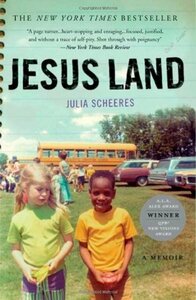Take a photo of a barcode or cover
This book made me cry. the abuse these kids experienced plus the bond she hjared with her brother made this memoir so memorable.
My heart is aching. So many feelings toward this book, but not sure if I can explain it. I feel so sorry for Julia and David. I was hoping for a happier ending. I'm rating this 4 stars because it's definitely lefts its mark on me.
A lot of this book made me uncomfortable because Scheeres is writing about trauma stemming from racism, child abuse, sexual abuse, religious fundamentalism, etc. Definitely not a lighthearted book. But I think that is a selling point of this memoir; it's poignant and captures her adolescence and relationship with her brother so well.
This was a really sad, painful book. Julia Scheeres tells the story of how she and one of her brothers were sent to an evil religious camp-- and what happened afterward.
This book is written very beautifully. A harrowing tale of life in 1970s rural Indiana, brimming with blatant racism and abusive Calvinist parents. Julia Scheeres is a very gifted writer, a recommended read for anyone who likes a well-written memoir.
This book was a pretty depressing tale. It was very well written, but sad. It solidified my reasons why I dislike fundamentalist Christians so much. Just because you SAY it is for Jesus, it does not mean your abuse is OK.
I chose this book because my own family is transracial - my husband, my two boys and I are white and my daughter is African American. Because of that, I'm interested in hearing the stories of other transracial families. Good god - I'm glad my family couldn't be more different from Julia's family. Julia's parents adopted her two black brothers because it was the Christian thing to do. It's another story - this time true - of white people thinking that they can save the black children by immersing them in white society and not acknowledging their race. Julia's parents are this and worse. They are "spare the rod and spoil the child" Dutch Calvinists. Julia's mother is cold and distant. Her father, a surgeon, seems to be mostly absent. He is mainly mentioned in relation to beating one of her two black brothers as punishment.
The family lives in a small town in Indiana. It's mostly white and the use of the n-word is common. David and Julia are best friends but even she distances herself from him when dealing with the issues surrounding his race become too much for her. To ease her guilt she turns to drinking and sex. David and Julia's parents end up sending them both to a reform school in the Dominican Republic called Esculea Caribe, where life is even harder and more brutal than it was at home. I researched Escuela Caribe a bit after reading this and it appears that as unbelievable as the treatment Julia and David endured sounds, it was true. The school could get away with a lot more being in a loosely regulated foreign country than they ever could have in the United States.
Julia writes her story in a detached manner almost devoid of emotion. It works though because I think when she was experiencing these events as a teenager, she detached herself and became numb to the abuse just to get through it. Reading this book was like listening to the teenage Julia telling you her story directly. Much like The Glass Castle, this book was difficult to read but I'm glad I did.
The family lives in a small town in Indiana. It's mostly white and the use of the n-word is common. David and Julia are best friends but even she distances herself from him when dealing with the issues surrounding his race become too much for her. To ease her guilt she turns to drinking and sex. David and Julia's parents end up sending them both to a reform school in the Dominican Republic called Esculea Caribe, where life is even harder and more brutal than it was at home. I researched Escuela Caribe a bit after reading this and it appears that as unbelievable as the treatment Julia and David endured sounds, it was true. The school could get away with a lot more being in a loosely regulated foreign country than they ever could have in the United States.
Julia writes her story in a detached manner almost devoid of emotion. It works though because I think when she was experiencing these events as a teenager, she detached herself and became numb to the abuse just to get through it. Reading this book was like listening to the teenage Julia telling you her story directly. Much like The Glass Castle, this book was difficult to read but I'm glad I did.
Wow. I could not put this book down. Julia Scheeres writes of the horrendous adolescence that she and her adopted African American brothers suffer at the hands of, first, her strict and disturbed Midwestern Calvinist parents and then, at the hands of an overseas "Christian reform school" to which her parents ship her and one of her brothers. The courage of Julia and her brother just pours off every page as they try to survive together against all odds.
The book lays bare the bizarre nature of fundamentalist Christianity--obsessed with those things it purports to deny--death and sex. I know this is accurate, because I have more than a small dose of fundamentalism in my background, and I actually worked with a teenager who was also victimized by a "Christian reform school" in the Dominican Republic. Maybe the same one? Who knows? The girl I knew came home as just a shadow of her former self. I can only hope she wasn't broken forever. Julias' story is beautiful and tragic and very, very real. She gets the little fundamentalist details of the 80's just right (all that Sandy Patti, Keith Green, and Amy Grant. Blech!!). These little details bring to life the bigness of what she has to say about her experience. I have nothing but admiration for anyone who can survive as she did--even thrive--in spite of all that went on in her young life. In fact, it is a testament to her loving connection with her brother, David, that she went on to succeed.
The book lays bare the bizarre nature of fundamentalist Christianity--obsessed with those things it purports to deny--death and sex. I know this is accurate, because I have more than a small dose of fundamentalism in my background, and I actually worked with a teenager who was also victimized by a "Christian reform school" in the Dominican Republic. Maybe the same one? Who knows? The girl I knew came home as just a shadow of her former self. I can only hope she wasn't broken forever. Julias' story is beautiful and tragic and very, very real. She gets the little fundamentalist details of the 80's just right (all that Sandy Patti, Keith Green, and Amy Grant. Blech!!). These little details bring to life the bigness of what she has to say about her experience. I have nothing but admiration for anyone who can survive as she did--even thrive--in spite of all that went on in her young life. In fact, it is a testament to her loving connection with her brother, David, that she went on to succeed.
"but good intentions go awry, as with missionaries bent on saving souls who obliterate entire tribal cultures in the process. Or former juvenile delinquents who find Jesus and decide to start reform schools."
Scheeres, Julia (2009-03-01). Jesus Land: A Memoir (p. 353). Counterpoint. Kindle Edition.
Scheeres, Julia (2009-03-01). Jesus Land: A Memoir (p. 353). Counterpoint. Kindle Edition.




